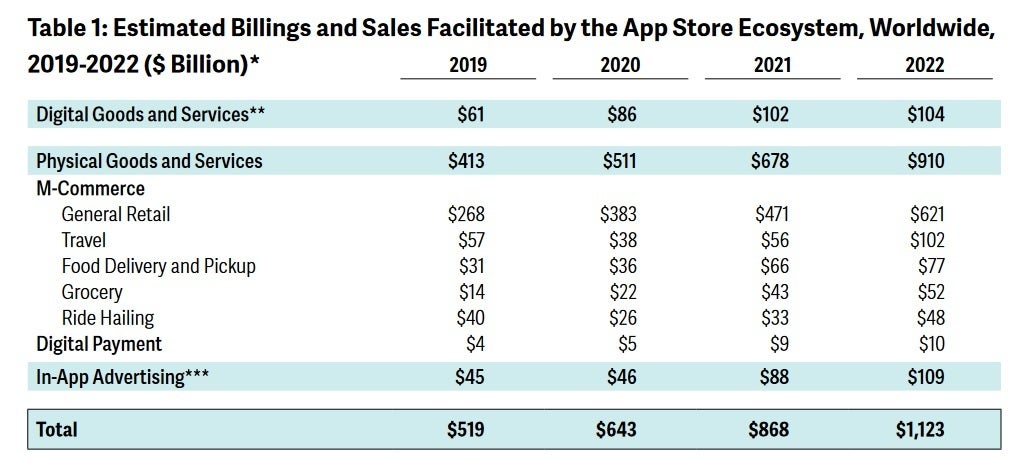Report shows the amazing strength of the global App Store ecosystem last year

Apple has released a new report that discusses the economic impact worldwide of the App Store. According to Apple, "The App Store ecosystem facilitated a groundbreaking $1.1 trillion in billings and sales worldwide in 2022." Before you open your phone's calculator to figure out what Apple's cut of this figure would be, the report makes a point of saying that more than 90% of that $1.1 trillion came from transactions that did not take place through the App Store.
The vast majority of these transactions created revenue for app developers and third parties and Apple did not collect any commission on these specific transactions. The report was funded by Apple and contains analysis from economists who work for the Analysis Group. The $1.1 trillion in total billings and sales generated last year by the App Store ecosystem was up 29% year-over-year.
The App Store economy includes more than app and in-app purchases
Instead of focusing on purchases made in the App Store including in-app purchases, the entire app ecosystem includes things like groceries purchased through an app, ride-sharing revenue derived from using an app (like Uber and Lyft), and travel bookings made through an app. The $1.1 trillion is the total amount of revenue worldwide that can be traced back to an app listed in the App Store.

Breakdown of the App Store ecosystem over the last few years
Last year the biggest revenue increases came from the travel (up 84%) and ride-share (up 45%) industries. Other categories that saw sales soar during the pandemic, such as food delivery and grocery sales, returned to more modest growth in 2022.
The report notes that "The App Store has been a safe and secure home to a large and varied array of apps for 15 years. Users today have access to over 123 times more apps than they did at the end of 2008, and annual downloads on the App Store increased 15-fold between 2009 and 2022. Users have downloaded apps more than 370 billion times and developers
have earned more than $320 billion in earnings directly on the App Store since its launch."
have earned more than $320 billion in earnings directly on the App Store since its launch."
The App Store has been supporting new areas of the economy over the past 15 years. It also has helped companies reach customers in new and lower-cost ways. And while last year the App Store ecosystem totaled $1.1 trillion, "9% originated from billings and sales of digital goods and services consumed on iOS apps; $910 billion, or 81%, from sales of physical goods and services made on iOS apps; and $109 billion, or 10%, from in-app advertising on iOS devices."
The three ways that App Store apps are monetized
In 2021 the Apple Store ecosystem totaled $868 billion, up from the $643 billion reported for 2020, and the $519 billion generated in 2019. The Analysis Group notes that the App Store ecosystem is based on three separate ways that apps are monetized. The first way is through the sale and distribution of digital goods and services through paid app downloads and in-app purchases. Examples include apps for dating, gaming, video and music streaming, fitness and health, and news and magazines.
The second monetization strategy is through the sales of physical goods and services. Apps in this category include ride-hailing, food delivery and pickup, grocery delivery and pickup, general retail, and travel, and digital payment apps. The third monetization strategy is to sell in-app advertising. Examples of apps using this strategy are social media apps and short video-sharing apps.
Apple and the App Store help developers distribute their apps around the world. As the report notes, "Thanks to the App Store, developers can seamlessly distribute their apps around the world and make sure users discover their apps. The App Store facilitates on average more than 747 million app downloads, 1.5 billion re-downloads, and 40 billion automatic app updates each week. The App Store’s global marketing team, editors, and the "Today," "App of the Day," and "Game of the Day" features are examples of how Apple helps developers drive discovery of their apps.
And while we might never know, could Steve Jobs had foreseen the economic impact of the App Store when it was launched in July 2008 with 500 apps?
Follow us on Google News














Things that are NOT allowed:
To help keep our community safe and free from spam, we apply temporary limits to newly created accounts: